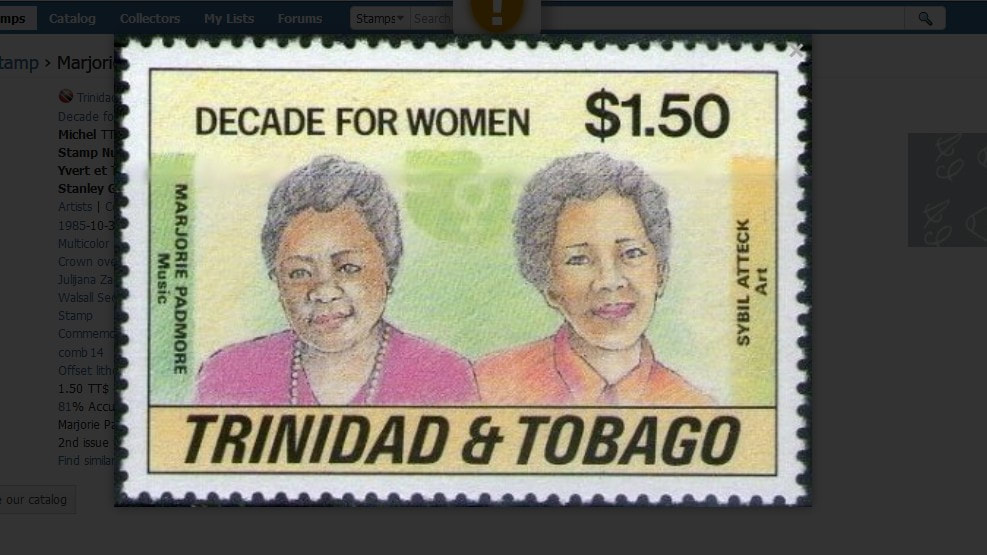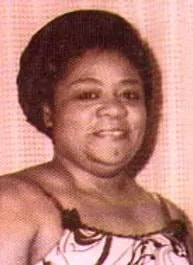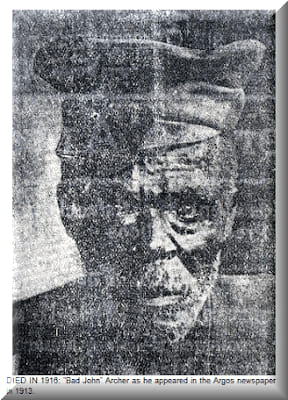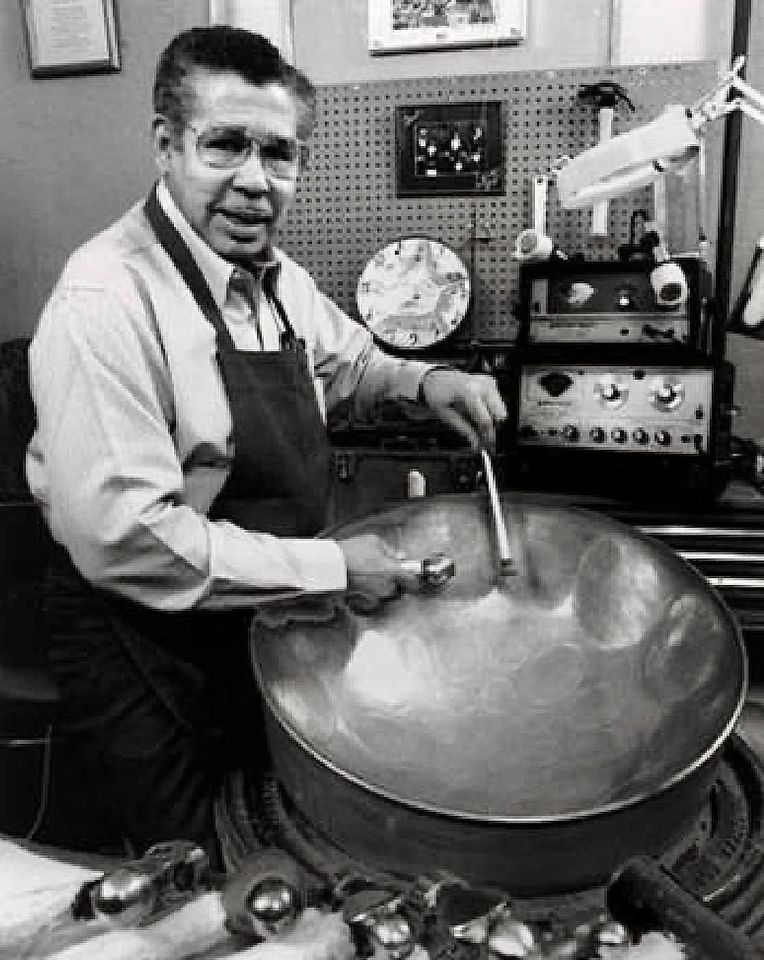|
The voices of individuals, organisations and politicians spoke out yesterday on the loss so many people felt at the news of Denyse Plummer’s death. The former calypsonian and pop and gospel singer died of cancer on August 27, at 69. Her death led the nation to reflect on a woman who gave a voice and a face to the plurality of what it means to be a citizen of TT. Her family confirmed her death on her Facebook page on Sunday, saying she was a wonderful mother, grandmother, wife and friend, and an exemplar to younger generations. The family’s statement added that she would be missed by many, but would live on through her music and “the beautiful impressions she left on everyone she met.” Initially, Plummer sang in bars and hotels before entering Calypso Fiesta in 1986. Newsday's BC Pires recalled in his Thank God It’s Friday column in 2021, “What Skinner Park was for Denyse Plummer in 1986, the year she transmogrified from relatively upmarket Chaconia Inn lounge singer to decidedly downmarket calypsonian at the Calypso Monarch competition semifinals. Singing to the famously hostile Skinner Park crowd, she was booed, jeered and pelted with toilet paper (mainly for being fair-skinned, because both her songs were good).” Despite the initial public reaction, Plummer’s persistence and dedication to the craft of calypso led her to become one of its treasured figures, and she won its major titles: National Calypso Queen, Young King and, in 2001, Calypso Monarch. In 2011 she was awarded the Hummingbird Medal. In 2015 she became a born-again Christian and performed and recorded gospelypso with artistes like Michelle Sylvester. She also published her book Crossover that same year. The National Carnival Commission’s tribute to Plummer on Monday said she was a true daughter of the soil who charted a journey that defined TT’s calypso landscape. “Multitalented and gifted, Denyse blended music and social commentary, blessing us with well-known songs like Nah Leaving, Heroes, Fire and Woman is Boss. Without question or exception, she has left a legacy as one of our nation’s most talented ambassadors and cultural icons.” Many of her fellow performers also paid tribute to her life and work. Soca artiste Destra Garcia, in an Instagram post, saluted Plummer’s musical legacy, recalling Plummer’s 1988 hit Woman is Boss and her 2001 Nah Leaving. Garcia said, “I salute queen mother. Thank you for being an inspiration and opening so many doors worldwide for the rest of us women, you helped pave the way, and taught us what the phrase Woman is Boss truly means, you fought a great fight.” Chutney soca artiste Drupatee Ramgoonai posted a photo of herself with Plummer and said it had been a “wonderful experience” to share many stages with her, including calypso tents, fetes and tours. Songwriter and composer Mark Loquan, who worked with Plummer on her 2003 and 2005 songs Identity and Frenzy, said it was a privilege to know her, and she crossed many barriers and boundaries to claim her success in the industry. Loquan said he would miss her presence. They had communicated, after a long time, about a fundraising concert for her, Thankful, which was held on May 13. “Imagine seeing her performing over so many years and getting to work several years with her in pan. I’m forever grateful for that rewarding experience. May she rest in eternal peace,” he added. Bandleader and producer Carl “Beaver” Henderson shared some facts about Plummer’s start in the music industry and what it was like working with her for 47 years. In a Facebook post, Beaver said before she started singing at Chaconia Inn, Maraval, she “honed her craft across the road...in a little known club called The Baron.” He produced her first batch of recordings, including her first album and number one hit, You’re What I’ve Waited For, which he wrote for her. “That single stayed on the charts at number one for 13 weeks. We won every award that year,” he recalled. Beaver also remembered being on stage as her musical director at Skinner Park when she got her “baptism of fire.” “No one fully understood your emotions in that moment except your husband Patrick and myself. I still marvel at the level of professionalism that you displayed immediately after.” Plummer and Beaver shared many live performances over the years, many fetes and concerts – so many he could not count them. “I also produced your last major iconic hit Nah Leaving (and that was a funny story by itself) which took you to winning the Calypso Monarch in 2001... “So much time spent at your home with your parents and family, so many memories. I spoke to you a little over a month ago and we said our farewell without actually saying so…,” he said. "My sister from another mother, fly high and proud. You have served well." Many other organisations and people shared condolences to Plummer’s family and their own personal story of what her life meant to them and the country. Among them were Pan Trinbago, the United National Congress,and the Ministry of Tourism, Culture and the Arts. UNC MP for Princes Town Barry Padarath recalled using a verse from Plummer’s Nah Leaving as he vied for a scholarship in 2001. “I was also fortunate to view Denyse’s performance at the National Calypso Monarch final that year in the big yard coincidentally. In all my life, I never witnessed a performance as majestic as the one Denyse delivered that night. Denyse was the embodiment of everything that was good about TT, she had a tremendous impact on my life and today remains one of the best artistes of all time,” Padarath said in his tribute. A post by the Tourism, Culture and the Arts Ministry said Plummer’s journey as a singer and legacy as a performer was punctuated with lessons in perseverance and dedication for people to follow. “Her work exemplified how the power of music could affect positive change. We will certainly miss her vibrancy and passion, but we will forever be grateful for the joy her music and life brought to our hearts,” it said. (Source: Newsday, August 29, 2023) Majorie Padmore : The woman who wrote our Independence Pledge and composed Our National Song8/29/2023 From Blogger Patricia Bissessar
The National pledge is an oath of allegiance or a solemn promise. Reciting the National Pledge in schools is intended to instill a sense of national patriotism and pride amongst our students. In Trinidad and Tobago, it is usually recited immediately after the singing of the National Anthem at the opening and closing of school terms and on special occasions like Independence Day and Republic Day. In the two Government Primary Schools where I served as principal, it was recited by the student body during morning assembly each day. However, despite this element being so integral to instilling national pride, respect for elders and country, many students are unaware of the person who was responsible for writing our National Pledge or understand what is the purpose of reciting the pledge - and indeed, why they might be pledging allegiance to their Country. Our National Pledge was written by Marjorie Padmore, musician and pioneer in Educational School Broadcasting was composed for school children and. Marjorie Padmore was also one of a pioneering team of educational broadcasters in the 1960s.The author Marjorie Padmore in the same year composed our National Song “God Bless Our Nation.In both pieces she thought long and hard as to what the words should mean. She was in love with her beloved Trinidad and Tobago a nation now about to start out and she felt pride in its future. Marjorie, also composed many jingles and rhymes for the Ministry of Education School Broadcasting Unit and was in fact its first female Director .For many years she worked long and hard to set a foundation for the Education system. Many may remember having to listen to the radio during the afternoon of the school day as she taught. Something that our children today seem to have to do once again using different technology. Marjorie was awarded the Hummingbird Medal for her significant contributions to nation building . (Source: Aspiring Minds T&T and the Virtual Museum of Trinidad and Tobago, Aug 23, 2023) All reactions: 2424  Renowned author and historian Michael Anthony has died. Anthony 93, passed away on Thursday after ailing for some time. His death was confirmed by his family in a statement. It read: "It is with profound sadness that we announce the death of our beloved father, who passed away peacefully last night at home surrounded by his family." "Michael was an icon and a giant in the literary world and his legacy is deeply woven into the tapestry of our nation, which he loved so dearly. Above all, Michael was an adoring husband, father and grandfather and we will miss him deeply. We thank you for your well wishes, and we kindly ask for privacy during this difficult time," the family added. Anthony wrote several books, including The Year in San Fernando and Green Days by the River. He was awarded the Hummingbird Gold Medal for his contribution to literature in 1979 and received an honorary doctorate from the University of the West Indies in 2003. He was also awarded a NALIS Lifetime Literary Award. (Source: The Loop, Aug 23, 2023) Did you know that on August 26th 1962 the Gov't of T &T launched the issue of Independence Saving Bonds to encourage all citizens to invest in the growth and development of our country? Citizens of T&T were able to purchase Independence Saving Bonds from as low as $10.00 up to $500.00. Permission has been granted to ABVMTT by Jazad N. Ali author of book " The Stamp Cancelling Machine Slogan Postmarks of Trinidad and Tobago 1923 -2023" to share the following excerpt taken from the book re " Independence Saving Bonds. Source: Virtual Museum of Trinidad and Tobago, August 25, 2023
Born Ebenezer Elliot, he was more popularly known a Papa Neezer or Neza. He was a direct descendent of original Merikin settlers George Elliot, on his father’s side, and George Blackwell, on his mother’s side, His parents arrived in Trinidad as "merikins" immigrants and settled in Moruga as free slaves from America.
Born of African American descent, Ebenezar attended the village primary school in Moruga up to seventh standard. He was raised a London Baptist in the Church in the Fifth Company Village, and he remained a devout Baptist and a conscientious Christian all his life. He had a special liking for Shango religion (many worshipers prefer the name Orisha.) , and became an accomplished drummer and adherent to the religion and eventually became an accomplished leader of the religion. Ebenezar was a family man, who was sociable, charitable, very approachable and because he established undying friendships and acquaintances, he became known as ‘Papa’ or ‘father’.Papa Neezar was 32-years-old when in a dream it was revealed to him that he had special healing powers to cure the sick and cast out evil spirits. Legend has it that while asleep in his garden one night a snake passed over him causing him no harm. He interpreted this as being bestowed with spiritual powers to give guidance to others for life issues and problems. Described as a dynamic person, he was well known for his prophecies using the ‘Obi Seed’ and bible passages (especially the Psalms) which he would use according to his revelations. All his ceremonies and rituals in the various manifestations of his spiritual powers began with paying homage to his ancestors.To Papa Neezar and his Orisha-worshiping followers ritual sacrifice was an important part of their beliefs and practices Animals, particularly chickens and goats, was often offered as sacrifices in situations such as serious illness or misfortune.After performing the rituals the meat from the sacrificed animals would then be cooked and distributed to the villagers. Fruits and vegetables are used frequently and are pleasing to the particular Orisha spirits. Papa Neezar did much to promote his religion and was very influential in the construction of a modern church in his community. According to Ms. Leonis Roberts, his granddaughter, he was not an Obeah man, but a helper and healer. "Obeah" she said “is not about doing bad from the long-time point of view but it was about helping people. He never took money, was not about the money." Papa Neezar fell ill and died at the San Fernando General Hospital on January 8, 1969.He was buried at the Third Company Baptist Church cemetery in Lengua. Long after his death historians discovered a turine (a large jar for mixing concoctions), morocoy shell, flambeaux, various sizes of clay bottles, a large black Bible, a corn mill and several items that can be found in an alchemist shop. In Moruga his name is still revered as a man of spiritual powers. Inspired by her mother who would always preach “Trini to de bone,” Keisha Dabrowski returned to Trinidad to immerse herself in the Emancipation Day festivities, learn about and expose her son to what their ancestors endured while enslaved in TT.
Dabrowski was born in Sangre Grande – her maiden name is Peters – and was a pupil of Arima Girls’ Government. She is happily married and her husband is of German, English and Polish descent. Together they have one son, Kristopher. When she was six-years-old, her mother migrated to the US. She said her father had migrated first before her mother, but her mother did not even tell her she was going and Dabrowski only found out when she came home from school that day. “Understanding what it means to be abandoned… I understand that. And I understand the plight of immigrants and their children. When I became a mum, I realised that was a hard thing for my mother to do because I could not even think of leaving my son far less to go to a country I knew nothing about.” She stayed with her aunt for two years and grew to look from her mum’s perspective, which she described as a leap of faith. At eight, her mother returned and took her to the US. “We were living in a small one-bedroom apartment in the US, but we had a house with a nice backyard where I used to make mud pies. But I also saw the opportunities because growing up in Brooklyn with a bunch of other immigrants from these other countries who became my community.” Dabrowski said there were people from the Caribbean and other countries working together and fighting for their children to have a better future. “I would go to Manhattan and Long Island with my mum who did domesticated work – babysit and clean – and I remember going there and saying, ‘I would love to live in a place like this one day. This is amazing.’ And only seeing white people and thinking, ‘I want to be like them, this is something that only they have.’” Dabrowski said her mother wanted her to have all the opportunities the US could offer, after realising that, she stopped at nothing to get it. She said the pivotal point in her life and one of the other reasons she chose to celebrate Emancipation Day in TT this year was when she learned about Jim Crow. “Racism is alive and well, and while in TT we will separate ourselves into Indo-Trini and Afro-Trini or Native people, in America, there’s white and everything else.” While in Trinidad, she never learned about slavery, but it made her wonder about the history of TT. After realising that the US’ Jim Crow era was just the construction of black identity – that would be used to justify slavery – she decided to pursue an undergraduate degree in communications and marketing at the New Jersey Institute of Technology. She jokes and says she went to an engineering college for a business degree. Her reasoning was if a black identity could be created for negative purposes, then it can be deconstructed and used as a way to educate people. “Typical to any Trini, I had so much pride in who I am and many times in the US, I say to them, ‘You see me and what you see is a black person because you have this binary sense of identity because if you really knew me, you’d know I was a part of a melting pot.’” Dabrowski said this is because TT has different heritages and everyone celebrates every holiday whether it be Diwali, Eid Ul-Fitr or Christmas. She also has a bachelor’s of science in business with a focus on marketing and a master’s in strategic organisational communication with a focus on corporate social responsibility from Rutgers, the State University in New Jersey. Rutgers – originally called Queen’s College – is a research university and is the second oldest in New Jersey after Princeton University. It also has a 58 per cent acceptance rate. She has worked at Rutgers for around nine years in different positions – executive director for student affairs and chief of staff to the vice chancellor of student affairs – because she always looked for the next step. She was also a part of the creation of the black history month curriculum for schools in New Jersey. Dabrowski said she then got a phone call in February of 2021 from her mother and she began giving back to her immediately. She took her shopping, travelling and to dinners among many other activities. “One day she was pushing my son in his stroller in my neighbourhood and someone came up to her and said, ‘Hi, I didn’t know Keisha hired a nanny,’ and she said (in her Trini accent), ‘I’m not the nanny, I’m the grandmother.’ She came and told me with so much pride and she had so much pride knowing her daughter lived in a neighbourhood like this.” The next time she got a phone call from her mother, she was told that her mother had stage four cancer and Dabrowski began calling everyone she knew to get her mother the proper healthcare she needed. At the time she was being recruited by Johnson and Johnson – US-based pharmaceutical industry company that has been in business since 1886 – to be a part of its health equity platform. During the interviews, she warned them that she would not let the company settle for the bare minimum and be comfortable. She told them, “People are dying… my mum is dying and she's dying because of health inequities. When I asked my mum, ‘How did we get here?’ She said, ‘When I went to my doctor, he was rough with me so I stopped going for my pap smears.’” Dabrowski said her mother told her it could have been because of her thick Trini accent made the doctor frustrated. “I decided that if I couldn't save my mom's life, I was going to save other people's mom's lives.” She said she never wants anyone to feel the hurt she felt and continues to feel to this day as there were many other experiences she wanted her mother to experience with her. “One of my best memories with her was taking her to Hawaii because she said she has never been. We flew first class and I remember getting into the plane and realising that you can lie back in the plane and she said this is what you see on TVs and she just couldn’t believe it. We stayed at Hilton Hawaiian Village in a three-bedroom penthouse suite and she looked at me and said, ‘Thank you.’” All Dabrowski said she could think about was wanting to give her mother all of this and more, but with the thought of knowing her mother was about to die in the back of her head. After her mother died last October, her biological father – who she did not grow up with – died shortly after in Trinidad and she realised he could have survived from a heart attack if there was better healthcare. When he died, that was the first time she returned to Trinidad in 30 years and Dabrowski said she immediately felt a connection to the island. After that, she wanted to learn everything about TT and experience everything it had to offer, so she did. Dabrowski took her son with her to every Emancipation Day celebration before their departure on Thursday and tried to gather as much information on TT’s history as possible. “I’ve been at the Hyatt (Wrightson Road, Port of Spain) and one of the things I have been disappointed in is that there has been no information about Emancipation Day. "I was in the elevator dressed in the traditional wear and a woman asked where I was going, I said I was headed to the Emancipation Day parade and she asked, ‘What is that?’” Dabrowski asked, “How can you have the Commonwealth Games happening right here and they don’t know such a pivotal moment for the island happening?” She said while at the Emancipation Village, Queen’s Park Savannah, there was only one small booth with information about the day when it should have been the main focus. She said more on the history of the island when people were enslaved must be brought out and the importance of Emancipation Day must be shared with pride and to the extent that people leave the island knowing the history of it. (Source: Newsday, August 5, 2023)
He was John Archer, a notorious, habitual criminal during the early years of the 20th century. A former soldier with the Second West India Regiment in his native Barbados, Archer arrived in Trinidad in 1887 as a stowaway on a ship, after fleeing the Panama Canal where he had gone to work but landed in trouble. He continued his violent ways in Trinidad where he was an alcoholic known for frequent street fights and use of obscene language. By the time Archer tallied up 119 convictions, he was called by the nickname "Bad John". Even a 1902 Mirror report on one of his court trials said he was "better known as 'Bad John’." Despite his reputation, Archer, a wharf worker, was credited with saving three persons from drowning in the muddy depths of the Port of Spain harbour. Ironically, Archer drowned in 1916. He was believed to be aged 62. Sources: Dictionary of the English/Creole of Trinidad & Tobago by Lise Winer Freddie Kissoon, Newsday, 2010 Photo: John “Bad John” Archer, Argo Newspaper, 1913 (Source: Dominic Kalipersad, January 16, 2020) Today, we celebrate the legendary steelpan pioneer Elliot “Ellie” Mannette, who is known as the co-inventor of the steelpan!
Mannette was the first person to sink the top of an oil drum into a concave surface, thereby changing the structure of the steelpan and how notes were placed upon it. He was born on November 5th 1927 in Sans Souci, and spent his childhood in Woodbrook. During the 1930s, the use of bamboo for musical instruments gave way to metal instead during the Carnival season, leading to the rise of “steel-bands”. In 1939, Mannette formed his band, The Oval Boys Steelband, which later became Invaders Steel Orchestra. After Winston “Spree” Simon discovered that creating dome-like sections in the surface of his “kettledrum” led to differing notes, Ellie Mannette later reversed this process during the 1940s, sinking the surface of an oil drum and creating the steelpan as we know it today. He also invented the rubber-tipped sticks that are used to play pan, which softens the notes. Exceptionally skilled in tuning, by 1951 Mannette had created the tenor pan, and even taught rival steel bands how to play the instrument. That year, he travelled to the UK with TASPO (Trinidad All Steel Percussion Orchestra) to present the steelpan at the Festival of Britain, accompanied by other pan leaders like, “Spree” Simon and Anthony Williams. In 1963, Mannette was invited by the US Navy to create the US Navy Steelband. He toured the US for years, educating and creating steel bands throughout the country, and by 1994 headed the steelpan programme at West Virginia University. US President Clinton bestowed upon him the 1999 National Heritage Fellowship, the highest honour in traditional arts. Mannette has been highly awarded, receiving the 1969 Hummingbird Silver Medal, an Honorary Doctorate from UWI in 2000, and was admitted to the United States Hall of Fame of the Percussive Arts Society in 2003. The Ellie Mannette Park was named in his honour in Port of Spain in 2001. Sadly, on August 29th, 2018 he passed away in West Virginia. This photo showing Ellie Mannette tuning a tenor pan is courtesy of the Trinidad Express Newspaper, 29 August 2018. This newspaper is part of the National Archives of Trinidad and Tobago Newspaper Collection.National Archives of Trinidad and Tobago. (Source: National Archives of Trinidad and Tobago, August 8, 2023) · |
T&T news blogThe intent of this blog is to bring some news from home and other fun items. If you enjoy what you read, please leave us a comment.. Archives
July 2025
Categories
All
|











 RSS Feed
RSS Feed